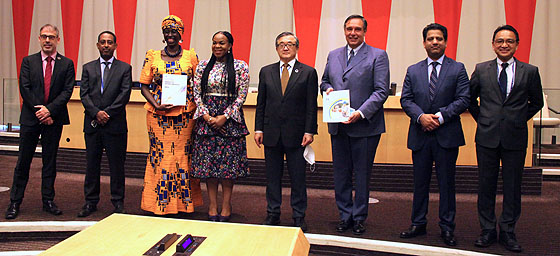UNSD is a co-custodian of the Sustainable Development Goal indicators 7.2.1 on renewable energy and 7.3.1 on energy efficiency, participating in publishing the SDG7 Tracking Report.
UNSD works with the UN Regional Commissions, is a JODI partner organization, the coordinator of the Oslo City Group on Energy Statistics and a key member of the Intersecretariat Working Group on Energy Statistics.

Tracking progress toward SDG 7
The United Nations Statistics Division is a co-custodian of the Sustainable Development Goal indicators 7.2.1 on renewable energy and 7.3.1 on energy efficiency.
UNSD is cooperating with the other four international organizations who are also custodians of SDG 7 - International Energy Agency, International Renewable Energy Agency, World Bank Group and World Health Organization - in tracking SDG 7, which called to ensure access to affordable, reliable, sustainable and modern energy for all.
A joint report of the Custodian Agencies Tracking SDG 7 The Energy Progress Report is now available here.
- Current and previous editions of Tracking SDG 7 The Energy Progress Report
To know more about Tracking SDG 7, please go to https://trackingsdg7.esmap.org.
The Technical Advisory Group on SDG 7 can be found at https://sdgs.un.org/sdg7tag.

Photograph from the global launch that was held for Tracking SDG7: The Energy Progress Report 2022
TRACKING SDG 7: The Energy Progress Report. Mr Stefan Schweinfest, Director, UNSD

Joint Organisations Data Initiative (JODI)
The UNSD is cooperating with seven international/regional organisations - APEC, Eurostat, IEA, IEF, GECF, OLADE and OPEC - in the Joint Organisations Data Initiative (JODI) which consists of a decentralized but coordinated monthly data collection of selected oil and gas statistics through the JODI Oil and JODI Gas Questionnaires.
For more information on JODI data collection at UNSD click here.
For the JODI World database and for more information on JODI, please visit www.jodidata.org.
Oslo City Group on Energy Statistics
The Oslo Group is a city group created by the UN Statistical Commission to address methodological issues related to energy statistics and contribute to improved international standards and improved methods for official energy statistics. It was established as a follow-up to the programme review of energy statistics during the 36th Session of the UN Statistical Commission (1-4 March 2005) and the recommendations of the Ad-hoc Expert Group on Energy Statistics (New York, 23-25 May 2005).
The terms of reference of the Oslo Group include the following:
- (a) Identify users' needs;
- (b) Define the scope of official energy statistics;
- (c) Identify and collect national and international best practices;
- (d) Review and contribute to the updating of the United Nations handbooks and manuals on energy statistics;
- (e) Identify gaps in the coverage of existing methodologies and develop methodologies to cover gaps;
- (f) Adopt links or develop bridges to international standard concepts and classifications in economic/environmental statistics to facilitate the integration and interface of energy statistics with other statistical systems;
- (g) Recommend a core set of tables as minimum requirements at the national and international level to satisfy the major users' needs.
Members of the Oslo Group include energy statisticians from national statistical offices, energy ministries/authorities and international organizations engaged in energy statistics as well as experts from academia and the private sector on an ad hoc basis as advisers. Statistics Norway served as the Secretariat of the Oslo Group until March 2013 when the Secretariat passed to Statistics Canada.
The Oslo Group meets on an annual basis to review and address methodological issues related to energy statistics as well as share country practices. The Oslo Group reports regularly to the UN Statistical Commission.
For more information on the Oslo Group, please visit: http://unstats.un.org/oslogroup.
Intersecretariat Working Group on Energy Statistics
As a follow-up to the programme review of energy statistics during the 36th Session of the UN Statistical Commission (1-4 March 2005) and the recommendations of the Ad-hoc Expert Group on Energy Statistics (New York, 23-25 May 2005), the UN Statistical Commission approved the establishment of the Intersecretariat Working Group on Energy Statistics to:
- "...enhance the coordination of international energy statistics and the collaboration of international (global, regional and sectoral) organizations with a view to improving the availability and quality of international energy statistics without increasing the response burden on countries and by making best use of resources". (see also the terms of reference)
The terms of reference of the Intersecretariat Working Group on Energy Statistics include the following:
- (a) Making an inventory of the current data collection, processing and dissemination system of the major organizations working on energy statistics;
- (b) Reducing the reporting burden by harmonizing data collection, processing and dissemination, by limiting duplication and/or by building links/bridges between existing energy statistics questionnaires, concepts, methods and timetables;
- (c) Improving sharing of the collecting/processing work between Organizations and enhancing data-sharing and data transmission once data validation procedures have been agreed and implemented;
- (d) Improving the coordination of energy statistics with social, economic and environmental statistics at the international level;
- (e) Promoting training and capacity-building and coordinating the related efforts;
- (f) Creating joint forums to promote the dialogue of statisticians and the user community;
- (g) Raising the profile of energy statistics and energy statisticians at all levels.
Members of Intersecretariat Working Group on Energy Statistics include: international organizations and agencies engaged in the collection of energy statistics from countries at the global, regional and sectoral levels; and major users of international energy statistics. The Secretariat of the Intersecretariat Working Group rotates among the members biennially. Currently, the International Energy Agency serves as Secretariat.
The Intersecretariat Working Group on Energy Statistics meets on a regular basis and reports regularly to the UN Statistical Commission.
For details on the Intersecretariat Working Group on Energy Statistics, visit http://www.iea.org/interenerstat_v2/index.asp.

